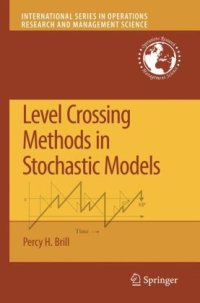
Ebook: Level crossing methods in stochastic models
Author: Percy H. Brill (auth.)
- Genre: Mathematics // Probability
- Tags: Mathematical Modeling and Industrial Mathematics, Probability Theory and Stochastic Processes, Operations Research/Decision Theory, Industrial and Production Engineering, Production/Logistics, System Performance and Evaluation
- Series: International series in operations research & management science 123
- Year: 2008
- Publisher: Springer US
- City: New York
- Edition: 1
- Language: English
- pdf
Since its inception in 1974, the level crossing approach for analyzing a large class of stochastic models has become increasingly popular among researchers. This volume traces the evolution of level crossing theory for obtaining probability distributions of state variables and demonstrates solution methods in a variety of stochastic models including: queues, inventories, dams, renewal models, counter models, pharmacokinetics, and the natural sciences. Results for both steady-state and transient distributions are given, and numerous examples help the reader apply the method to solve problems faster, more easily, and more intuitively.
The book includes introductory material for readers new to the area, as well as advanced material for experienced users of the method, highlighting its usefulness for analyzing a broad class of models and illustrating its flexibility and adaptivity. The concepts, techniques, examples, applications and theoretical results in this book may suggest potentially new theory and new applications. The result is an essential resource for researchers, students, and professionals in operations research, management science, engineering, applied probability, statistics, actuarial science, mathematics, and the natural sciences.
Since its inception in 1974, the level crossing approach for analyzing a large class of stochastic models has become increasingly popular among researchers. This volume traces the evolution of level crossing theory for obtaining probability distributions of state variables and demonstrates solution methods in a variety of stochastic models including: queues, inventories, dams, renewal models, counter models, pharmacokinetics, and the natural sciences. Results for both steady-state and transient distributions are given, and numerous examples help the reader apply the method to solve problems faster, more easily, and more intuitively.
The book includes introductory material for readers new to the area, as well as advanced material for experienced users of the method, highlighting its usefulness for analyzing a broad class of models and illustrating its flexibility and adaptivity. The concepts, techniques, examples, applications and theoretical results in this book may suggest potentially new theory and new applications. The result is an essential resource for researchers, students, and professionals in operations research, management science, engineering, applied probability, statistics, actuarial science, mathematics, and the natural sciences.